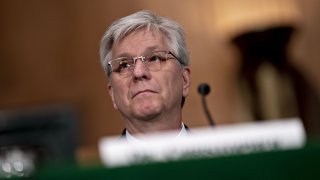
- Federal Reserve board member Christopher Waller said Wednesday that he expects interest rates to rise considerably over the next several months.
- In a CNBC interview, Waller said current data on inflation and the general strength of the economy justify half-percentage-point increases ahead.
- The Fed normally increases in 25-basis-point increments.
Getting inflation under control will require raising interest rates at a faster pace than normal even though the pace of price increases probably has peaked, Federal Reserve board member Christopher Waller said Wednesday.
That means the central bank likely will hike short-term rates by half a percentage point, or 50 basis points, at its meeting in May, and possibly follow it up with similar moves in the next several months, Waller told CNBC. The Fed normally increases in 25-basis-point increments. A basis point equals 0.01%.
Get Connecticut local news, weather forecasts and entertainment stories to your inbox. Sign up for NBC Connecticut newsletters.
"I think the data has come in exactly to support that step of policy action if the committee chooses to do so, and gives us the basis for doing it," he said during a live "Closing Bell" interview with CNBC's Sara Eisen. "I prefer a front-loading approach, so a 50-basis-point hike in May would be consistent with that, and possibly more in June and July."
Markets already have almost fully priced that level of increase at next month's Federal Open Market Committee meeting, as well as the following session in June, according to CME Group data that tracks moves in the fed funds futures market. Pricing for July also is tilting that way, with a 56.5% probability of another 50-basis-point hike.
That means that should the Fed choose to move aggressively, it won't come as a surprise.
Money Report
Waller said he thinks the central bank can pull off the tighter policy now because the economy is strong enough to support higher rates. The Fed is looking to raise rates to stave off inflation running at its highest levels in more than 40 years.
"I think we're going to deal with inflation. We've laid out our plans," he said. "We're in a position where the economy's strong, so this is a good time to do aggressive actions because the economy can take it."
Nevertheless, there is some disagreement over how aggressive FOMC members want to be in the inflation battle.
In March, those favoring a quarter-percentage-point hike held just a tiny majority over those who wanted to double that. Officials through their public statements have offered differing views about how far the Fed should go, with Waller part of a group that wants rates to go past "neutral," or the point where they are considered neither restrictive nor stimulative. The neutral funds rate now is considered to be around 2.5%.
On the other side of the debate, policymakers including Fed board member Lael Brainard and Chicago Fed President Charles Evans have said in recent days that they would rather get the rate to neutral and then assess what future actions may be needed.
"I think we want to get above neutral certainly by the latter half of the year, and we need to get closer to neutral as soon as possible," Waller said.
St. Louis Fed President James Bullard told the Financial Times that it's "fantasy" to think rates can go to neutral and still bring down inflation.
For his part, Waller said he is confident inflation will start coming down, even though the Fed's powers are limited to control the lagging supply chains associated with the current round of higher prices.
"All we can do is kind of push down demand for these products and take some pressure off the prices that people have to pay for these products," Waller said. "We can't produce more wheat, we can't produce more semiconductors, but we can affect the demand for these products in a way that puts downward pressure and takes some pressure off of inflation."
Earlier in the day, Treasury Secretary Janet Yellen, a former Fed chair, said of the agency's board members, "It's their job to bring inflation down."
"They have a dual mandate. They will try to maintain strong labor markets while bringing inflation down," Yellen said during an appearance before the Atlantic Council. "And it has been done in the past. It's not an impossible combination, but it will require skill and also good luck."






